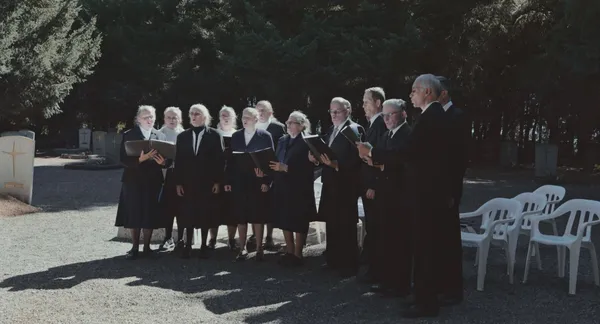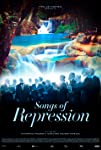Eye For Film >> Movies >> Songs Of Repression (2020) Film Review
Songs Of Repression
Reviewed by: Amber Wilkinson

Marianne Hougen-Moraga and Estephan Wagner tread carefully with their documentary profile of the German religious community the Colony of Dignity in Chile - which, in stark contrast to its tranquil name and bucolic setting, became a hotbed of sexual and physical abuse for decades.
Beneath all the religious trappings, leader Paul Schäfer created a climate of spying and brutal group beatings. In 2006, he was finally jailed for his crimes and died in prison, aged 88 - all facts we learn via intertitles, that fill in the backstory to the place, allowing the film itself to centre the survivors of the abuse and their ongoing experiences.

What emerges is a careful consideration of the impact of this sort of long-term abuse, particularly within the confines of a small community. Hougen-Moraga and Wagner spent more than three years building relationships with the people here and it shows in the intimacy they achieve in their interviews. Some members of the town put the emphasis on forgetting the past, while others are obviously still grappling with it in more immediate ways.
The vestiges of what might be considered the 'old regime' are evident, from the way that permission is frequently sought - "Should I take my hat off?" - to an older generation who are disturbingly inquisitive about what is going on to the unsettling way that the children of the former community leaders, known as "hierarchs" still hold sway in the colony today. More heartbreaking still are revelations that come out through the course of the interviews, as long buried thoughts and emotions surface, none more so than a woman who has never made the connection between sexual interaction and love before. Those songs of the title are also a bone of contention, at once a communal activity and heavily linked to the religious faith that many still retain, something that should bring people together in harmony and yet which carry with them the discordant notes of a terrible past.
The directors also widen their scope to consider the current thrust of the community - which is angling itself as a sort of luxury destination, while also, in what many might consider an odd way, using its dark history as a tourist draw. The idea of 'forgetfulness' also extends to the way many residents now want to gloss over the community's collaboration with Pinochet's mass killings - in yet another starkly presented fact we learn that 16,000 people were buried in mass graves here.
Questions of ethics and emotions cling to the film in a similar way to those addressed by the likes of documentary KZ, which considered the idea of "Holocaust tourism" or the recent Irish short Stop Nineteen, which examines tourism in the context of The Troubles. The film also shares some DNA with any number of films that consider what happens in post-war states, when the oppressed must live alongside their former oppressors, such as Joshua Oppenheimer's The Look Of Silence. As always, there are no easy answers but this is a thoughtful and well-balanced film that tries to ensure an entire chorus of voices and opinions are heard.
Reviewed on: 10 Nov 2020
















